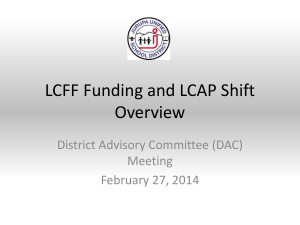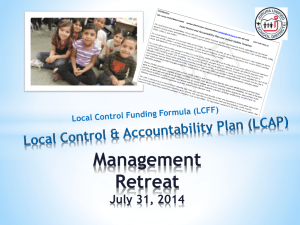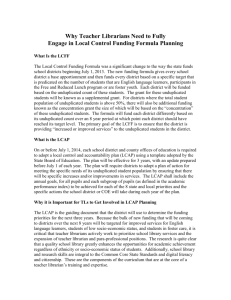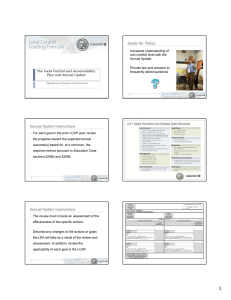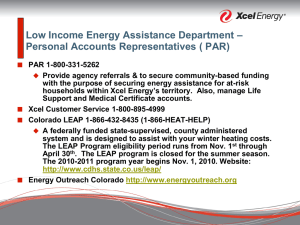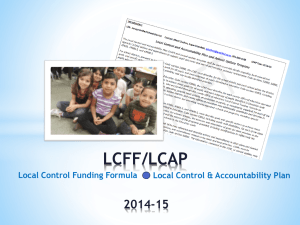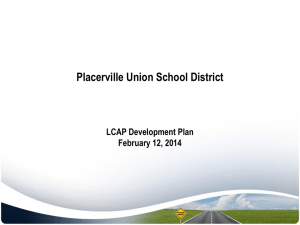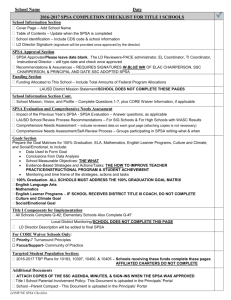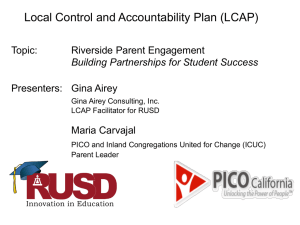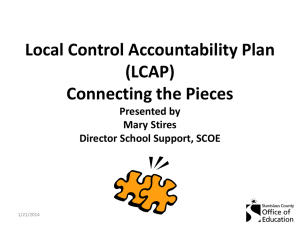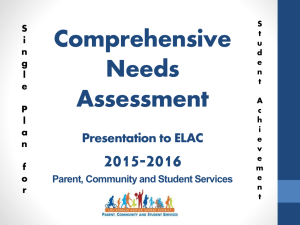Aligning Plans to Ensure Student Success
advertisement
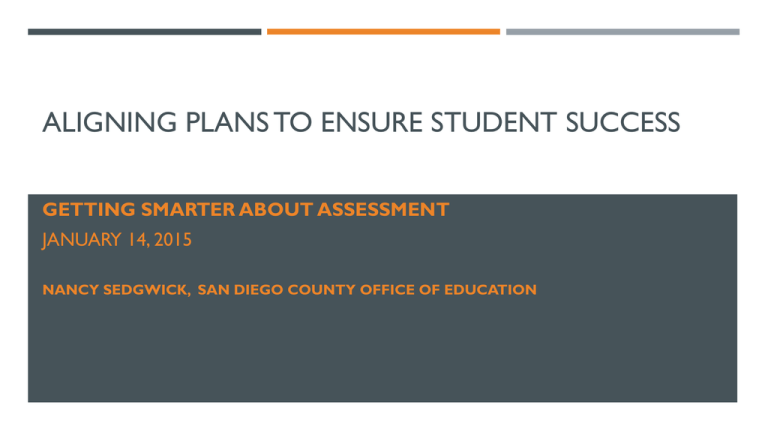
ALIGNING PLANS TO ENSURE STUDENT SUCCESS GETTING SMARTER ABOUT ASSESSMENT JANUARY 14, 2015 NANCY SEDGWICK, SAN DIEGO COUNTY OFFICE OF EDUCATION BACKGROUND ON PLAN ALIGNMENT With the transition to a new statewide system of assessments, the revision of a state accountability system, and the implementation of a new funding system, the State Superintendent of Public Instruction (SSPI), the California Department of Education (CDE), and the State Board of Education (SBE) recognize the need to review the landscape of current state and federal plan requirements. The Plan Alignment and Coordination Project (PACP) was established to address this need and will develop and highlight resources to support an integrated and coordinated planning process. The work began in June of 2014 and is continuing. BACKGROUND ON PLAN ALIGNMENT The PACP determined that there were 33 possible plans required under various state and federal programs Of those, three would be the most likely to be able to be aligned LCAP LEAP Title III SO MANY PLANS, SO LITTLE TIME LEAP – Local Education Agency Plan LCAP – Local Control Accountability Plan SPSA – Single Plan for Student Achievement Title III Plan Safety Technology Library Professional Development Plan SIMPLIFY YOUR LIFE What should all plans share? Support the mission, vision and objectives of the district and site Based on an analysis of data and needs assessments Same end result desired – achievement of district and site goals Allocation of resources aligned to goals and objectives A systemic method of monitoring implementation and results PLAN ALIGNMENT LCAP LEAP (and Title III Plan) Action and Spending Plan for LCFF funds Action and Spending Plan for Federal Title I, II, III funds Goals Based on State (and Local) Priorities Goals Based on NCLB Priorities Basic Services Proficiency in ELA and Math, especially for at-risk students Implementation of State Standards Graduation Rate Access to a Broad Course of Study English Learner achievement Pupil achievement, and other student outcomes, including for unduplicated students English Learner parent involvement Parent Involvement Pupil Engagement – includes graduation rate School climate SPSA – • Action and spending plan for federal funds • Site level goals, including NCLB goals PLAN ALIGNMENT LCAP Three Year Plan with Annual Update Includes Budget Expenditure Plan for LCFF, other funds also allowed Aligns to CDE budget approval process General Funds with possible Supplemental and Concentration Funds to target services/actions to unduplicated students LEAP Five Year Plan with Annual Update Includes Budget Expenditure Plan for Federal funds, other funds also allowed Supplemental funds to target services to academically at-risk students Title III Plan– • Five Year Plan with Annual Update • Includes Budget Expenditure Plan for Title III funds • Supplemental funds for ELs SPSA – • • 1-2 year plan with annual update Includes Budget Expenditure Plan for Federal supplemental funds for at-risk students, other funds allowed PLAN ALIGNMENT LCAP Outcomes based on required metrics, showing progressive growth over three years Required Annual Update to review achievement of outcomes LEAP Outcomes included with Goal Statement Annual revision does not require monitoring achievement of Outcomes Data disaggregated to track achievement of sub-groups Data disaggregated to track achievement of unduplicated students, ethnic groups and Special education Title III Plan– • Outcomes included in Goal Statement • Annual revision includes monitoring Outcomes SPSA – • Outcomes included in Goal Statement • SSC should monitor plan effectiveness and achievement of outcomes PLAN ALIGNMENT LCAP Actions and Services address all areas of school and LEAP Actions and Services (or strategies) address specific supplemental strategies to meet the needs of identified students district operations, including base program. Stakeholder engagement is required, and is more prescriptive and involved than other plans Other differences: Process and timeline for approval Proportionality demonstration DAC needs to be involved in the revision process Title III Plan– • • Actions and Services (or strategies) address specific supplemental strategies to meet the needs of identified students DELAC involved in planning SPSA – • SSC and ELAC must be involved in plan revision and monitoring. CLEAR VISION With input from stakeholders involved in a sophisticated and in-depth look at district and school data which is: Easily accessible Purposefully displayed Publicly discussed ( Tom Many) Discussion leads to agreement on prioritized needs Possible solutions are researched and shared widely with all stakeholders District wide agreement on next steps (solutions) to address prioritized needs GOALS Goals support the vision With a clear and common vision would the goals for different plans need to be different? GOAL ACTIVITY Brainstorm two goals for the sample district, one academic and one on school climate. Refine the goal to be used for the LCAP, for the LEAP and for the SPSA ACTIVITIES/ACTIONS/SERVICES These are the "how". What will the district and school do to support the achievement of the goal? Would these be different for the district vs the school? What are district non-negotiables, and where do schools have flexibility? How much detail is needed? ON-GOING ACCOUNTABILITY TO THE PLANS Timely assessment and feedback on the effectiveness of the actions At the school and district level Efficient and effective process for feedback and correction The role of Formative vs benchmark assessments in the continuous improvement process FINAL THOUGHTS Questions Next Steps Contact Information nancy.sedgwick@sdcoe.net
